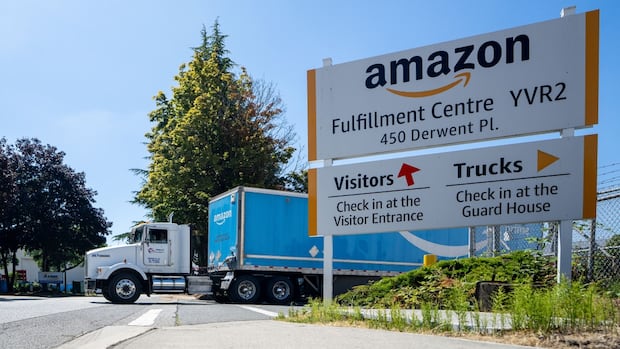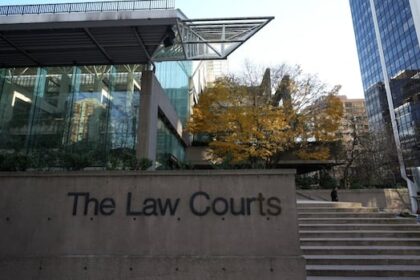British ColumbiaThere are fears that Amazon may pull out of its B.C. operations after a recent Labour Relations Board ruling confirmed union certification at a Delta, B.C. warehouse.Fears that Amazon may pull out of B.C. market after labour relations board ruling, but company set to appealAkshay Kulkarni · CBC News · Posted: Aug 10, 2025 5:18 PM EDT | Last Updated: 6 hours agoThe B.C. Labour Relations Board has sided with Unifor and awarded union certification to workers at the Amazon fulfilment centre in Delta, B.C. — raising fears the company could pull out of the province, like it did in Quebec. (Ethan Cairns/CBC)There are fears that Amazon may pull out of its B.C. operations after a recent Labour Relations Board (LRB) ruling confirmed union certification at a Delta, B.C. warehouse.The LRB recently rejected the U.S. megacorporation’s attempt to overturn a previous ruling that granted certification to workers that had signed union cards at the facility, which employs hundreds of people.That previous ruling had found that Amazon had ramped up hiring dramatically to dilute union support, in a move that was characterized as an unfair labour practice by the LRB and was heavily criticized by the Unifor union.While Amazon said it intends to further appeal the latest decision, the progress on unionization has led to fears the company may pull out of B.C. — as it did in Quebec, following the unionization of a warehouse in Laval, Que., in May 2024.Labour experts said the latest ruling is part of a long-running pattern of anti-union activity by Amazon, though much is up in the air over whether the company could pull out of B.C. entirely, given the province’s labour laws.Gavin McGarrigle, Western regional director for the Unifor union, is seen in November 2019. He said the union was in the process of asking Amazon workers what they wanted in a contract, and urged the company to get into collective bargaining negotiations. (Ben Nelms/CBC)”We’re certainly always concerned about that. We’ve reached out to the government to always strengthen the laws,” Gavin McGarrigle, the Western regional director for Unifor, said of the prospect of Amazon pulling out of B.C.”We’ve pointed to the situation in Quebec. We’re not going to put up with any of that. We’re going to throw everything we have at this.”An Amazon spokesperson said the company would determine its next steps after an appeal and that it did not have further comments on its future in B.C.Company historically anti-union: prof.In B.C., if more than 55 per cent of eligible workers at a facility sign union cards, union certification is granted automatically, while if the cards represent at least 45 per cent, a vote may be called instead. The LRB had previously granted Unifor certification through a rare remedial order that’s used when employer misconduct compromises the integrity of a vote.It came after Amazon brought in 148 new employees between March and June 2024 — a period that overlapped with two certification attempts by Unifor.WATCH | Union certified at Amazon warehouse: Delta, B.C., Amazon workers certified to unionize Amazon workers in Delta, B.C., were certified to unionize on Friday, in a ruling from the B.C. Labour Relations Board. Gavin McGarrigle, the western regional director of Unifor, says he’s optimistic the legislation will force Amazon to the bargaining table.Barry Eidlin, an associate professor of sociology at McGill University, said: “The Labour [Board] basically found that Amazon had behaved in such an egregious way, in trying to prevent its workers from unionizing, that it’s made any kind of fair election or certification procedure impossible.”Supriya Routh, an associate professor at the University of B.C.’s Allard School of Law who studies labour and employment law, said Amazon has historically been anti-union at their workplaces.”Their union-busting activities are taken as a badge of pride,” he said. “But I don’t think in the Canadian context that kind of a policy, that kind of an approach, will work — because I don’t think it goes well with Canadian sensitivities.”If Amazon wants to do business in Canada, which I do think they have a lot of reasons to do, they’ll have to adhere to laws and the legitimate expectations of workers in Canada.” Eidlin said that Amazon’s appeals at the Labour Relations Board, over its Delta warehouse, were part of a stalling tactic to delay union formation as long as possible. (Ethan Cairns/CBC)What B.C.’s labour laws sayEidlin and Routh both say that B.C.’s labour laws will soon mandate that the two parties negotiate a collective agreement, or have an arbitrator impose an agreement on them.That could mean a ticking clock on when the Unifor union in Delta gets a contract, which would represent a first for a North American Amazon warehouse — but also the possibility of the company pulling out as it did in Quebec.Amazon has steadfastly maintained that its decision to pull out of that province was over cost reductions and efficiency, and it decided to use third-party carriers to provide savings for customers.Amazon’s decision to close its Quebec warehouses led to the layoffs of over 4,500 people, some of whom are seen protesting in February. The company has maintained the decision was over logistics and not unionization. (Paula Dayan-Perez/CBC)Eidlin said it may be harder for Amazon to continue to serve the B.C. market if they entirely pull out of the West Coast, saying the company was able to fill the gaps in Quebec through services in Ontario, and the logistics may be more complicated in B.C.According to the professor, while there is limited legal recourse for when a private company ends its operations in a province, B.C. still had a legal framework that aims to defend the core Canadian values of allowing workers dignity and respect at work.”If that’s under attack, it’s something that should be defended,” he said.”It’s not something that should be, sort of, jettisoned in the name of competitiveness or something like that.”Amazon adds value to local economy: studyWhen Amazon announced the opening of its Delta, B.C., facility in 2018, it had estimated at the time that more than 700 jobs would be created as a result. The company’s 2023 impact report stated it has 10,000 full-time and part-time employees in B.C.A paper by Evan Cunningham, a PhD economist at the University of Minnesota, looked at the expansion of Amazon warehouses across the U.S.It found that the company’s entry into a metro area in that country had increased the local employment rate by one per cent and average wages by 0.7 per cent.Amazon has over 10,000 employees in B.C., according to its 2023 impact report. (Ethan Cairns/CBC)”Actually, most of the jobs created as a result of Amazon’s entry are actually not at Amazon warehouses themselves,” Cunningham told CBC News.”I find significant positive spillovers across the entire labour market … these warehouses also created opportunities within construction, within restaurants, within administrative services and also information technology.”Cunningham noted, however, that Amazon’s entry into an area also saw local housing prices go up, which could actually exacerbate income inequality.”Homeowners see a significant improvement in their wealth as a result of those rising home values,” he said.”For renters, on the other hand, the improvements in the labour market are almost completely offset from those higher costs of living.”ABOUT THE AUTHORAkshay Kulkarni is an award-winning journalist who has worked at CBC British Columbia since 2021. Based in Vancouver, he is most interested in data-driven stories. You can email him at akshay.kulkarni@cbc.ca.With files from Sohrab Sandhu, Meera Bains and Shaurya Kshatri
What happens next after union certification at Amazon warehouse in B.C.











